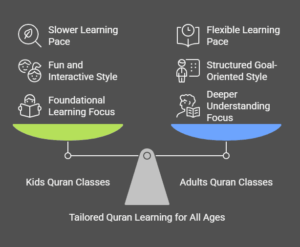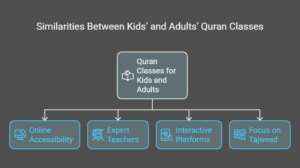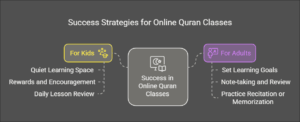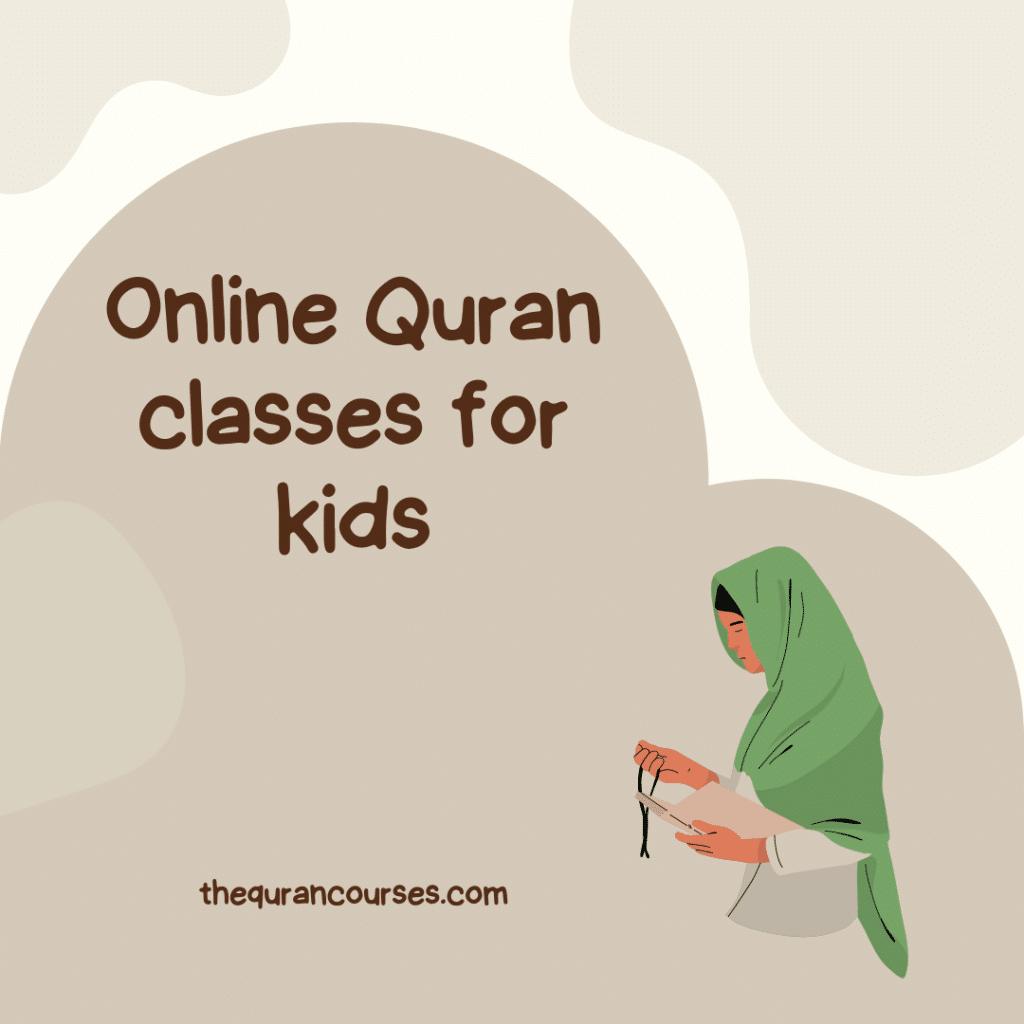Online Quran classes have become an essential tool for Muslims around the world, providing an accessible and flexible way to learn the Quran. However, the learning needs of children and adults are vastly different. Whether you’re enrolling your child or seeking classes for yourself, it’s important to understand the key differences in teaching methods, content focus, and learning outcomes. This guide will provide an in-depth comparison of online Quran classes for kids versus adults to help you make the right choice.
Key Differences Between Online Quran Classes for Kids and Adults

| Aspect | Kids | Adults |
| Learning Objective | Focus on foundational learning: Noorani Qaida, Quran recitation, and basic Tajweed. | Emphasis on deeper understanding: Tajweed, Tafsir, memorization, or Quranic Arabic. |
| Teaching Style | Fun, interactive, and engaging (games, stories, visuals). | Structured and goal-oriented with a focus on detailed explanations. |
| Learning Pace | A slower pace with consistent reinforcement. | Flexible and often faster, adjusted to fit the learner’s schedule. |
| Teacher Approach | Patient and nurturing, focused on building interest. | Analytical and explanatory, catering to self-driven learners. |
| Class Length | Shorter sessions (15–30 minutes) to suit shorter attention spans. | Longer sessions (30–60 minutes) to allow for in-depth discussions. |
| Course Content | Emphasis on learning Arabic letters, simple Tajweed rules, and short Surahs. | Advanced topics like Quran memorization, Tafsir, and Quranic Arabic grammar. |
| Parental Involvement | Parents often supervise and guide learning. | Independent learning with minimal supervision. |
Online Quran Classes for Kids
Children have unique learning needs, and online Quran classes for kids are designed to make Quranic education accessible, fun, and effective. Here’s how these classes cater specifically to children:
1. Focus on Foundational Skills
Kids’ Quran classes typically begin with Noorani Qaida, which teaches them Arabic letters, pronunciation, and basic Tajweed rules. This forms the foundation for reading and reciting the Quran.
2. Engaging and Interactive Learning
Children learn best when they’re actively engaged. Many online platforms use:
- Visual aids like colorful charts and videos.
- Games and quizzes to reinforce lessons.
- Storytelling to teach Islamic values and the stories of Prophets.
3. Shorter Sessions
Children have shorter attention spans, so classes are often kept brief (15–30 minutes) to maintain focus and avoid fatigue.
4. Parental Involvement
Parents are encouraged to supervise or participate in their child’s learning journey. This ensures consistency and helps reinforce lessons at home.
Online Quran Classes for Adults
Adults approach learning the Quran with a different mindset and set of goals. Whether they’re revisiting the Quran after years or learning it for the first time, these classes are tailored to their specific needs.
1. Advanced Learning Goals
Adults often seek Quran classes for:
- Mastering Tajweed: Improving pronunciation and recitation.
- Memorization (Hifz): Committing verses or the entire Quran to memory.
- Tafsir: Understanding the meaning and context of Quranic verses.
- Quranic Arabic: Learning the language of the Quran for deeper comprehension.
2. Flexible Scheduling
Online Quran classes for adults are designed to accommodate busy schedules. Many platforms offer flexible class times, allowing students to balance Quran learning with work and family commitments.
3. One-on-One Sessions
Adults often prefer private lessons for focused and personalized attention. One-on-one classes allow for deeper discussions, tailored pacing, and detailed answers to questions.
4. Self-Driven Learning
Unlike children, adults are self-motivated learners. They take responsibility for their progress and may dedicate additional time to practice outside of class.
Similarities Between Kids’ and Adults’ Quran Classes

Despite their differences, there are some overlapping features in Quran classes for kids and adults:
- Online Accessibility: Both kids and adults benefit from the convenience of learning from home.
- Expert Teachers: Qualified tutors cater to the needs of both age groups.
- Interactive Platforms: Tools like screen sharing, audio-visual aids, and live chat are used for effective learning.
- Focus on Tajweed: Proper Quranic pronunciation is emphasized for all learners.
How to Choose the Right Quran Class for Your Needs
For Kids
- Look for a Kid-Friendly Curriculum: Choose a program that focuses on foundational skills like Noorani Qaida and simple Tajweed.
- Prioritize Engagement: Ensure the platform uses interactive tools to keep your child interested.
- Check Class Duration: Opt for shorter classes tailored to children’s attention spans.
- Seek Qualified Tutors: Select teachers experienced in working with children.
For Adults
- Define Your Goals: Identify whether you want to improve Tajweed, learn Tafsir, or memorize the Quran.
- Consider Flexibility: Look for platforms offering classes at times that suit your schedule.
- Choose Advanced Programs: Select courses that cater to higher-level learning objectives, such as Quranic Arabic or Tafsir.
- Evaluate the Instructor: Ensure the teacher has experience in adult education and can provide detailed explanations.
Platforms Offering Quran Classes for Kids and Adults
1. The Quran Courses Academy
- For Kids: Interactive lessons, fun quizzes, and beginner-friendly content.
- For Adults: Advanced Tajweed, memorization, and Tafsir courses.
2. Quran Institute Online
- Offers tailored courses for both kids and adults, with one-on-one classes.
3. Bayyinah TV
- Focuses on Quranic Arabic and Tafsir for adults, with beginner options for kids.
Tips for Success in Online Quran Classes

For Kids
- Create a quiet, distraction-free learning space.
- Use rewards and encouragement to motivate consistent learning.
- Review lessons daily to reinforce progress.
For Adults
- Set clear learning goals and stick to a schedule.
- Take notes during classes and review them regularly.
- Practice recitation or memorization outside of class for better retention.
FAQs About Quran Classes for Kids vs. Adults
- Can kids and adults learn Quran from the same platform?
Yes, many platforms cater to both age groups but offer separate classes tailored to their needs.
- How long are Quran classes for kids and adults?
Kids’ classes typically last 15–30 minutes, while adults’ classes last 30–60 minutes.
- Is Tajweed taught to both kids and adults?
Yes, Tajweed is an essential part of Quranic education for both age groups, though the teaching approach differs.
- Are online Quran classes effective for beginners?
Absolutely! Online classes are structured to support learners at all levels, from complete beginners to advanced students.
- What’s the cost difference between kids’ and adults’ classes?
Adults’ classes may cost slightly more due to advanced content and longer sessions.
Conclusion
Choosing between Quran classes for kids and adults requires understanding the unique needs and learning objectives of each age group. While kids benefit from engaging, foundational lessons, adults often seek advanced courses with a focus on deeper understanding.
No matter your age or level, online Quran classes provide an accessible and effective way to strengthen your connection with the Quran. Select a program that aligns with your goals and enjoy a fulfilling learning experience that nurtures your faith and spirituality.
Ready to start? Explore the best online Quran classes for kids and adults today!



